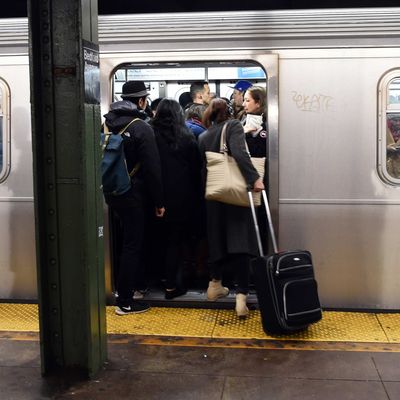
Maybe you saw the recent, disheartening news that New Yorkers have longer work weeks than residents of any other major U.S. city. One of the main reasons the New York City work week is so long, according to the new report by city comptroller Scott M. Stringer, is that commuting takes for-freaking-ever. Each week, an average New Yorker spends six hours and 18 minutes commuting, well above the national average of four hours and 11 minutes.
With this in mind, Science of Us took a dive into the scientific literature on commuting. Here are the best facts we found on the daily routine, and the variety of ways it’s sucking the soul right out of you. (The short version is: Commuting is mostly terrible and you should probably work from home if you can.)
The worst thing you’ll do all day is your morning commute. Social scientists Daniel Kahneman and Alan B. Krueger surveyed about 900 women in Texas, asking which of their daily activities made them happiest. At the very bottom of the list — worse than working or cleaning house — was the morning commute. (The evening commute, incidentally, is the third worst thing you’ll do all day, according to this sample.)
You’ll never get used to it. It’s awful every day, but each day carries its own particular awfulness. “You can’t adapt to commuting, because it’s entirely unpredictable,” Harvard University psychologist Daniel Gilbert has said. “Driving in traffic is a different kind of hell every day.”
But you’ll be happiest if you walk, bike, or take the train. People who commute in these three ways are more satisfied with their commutes than people who drive, take the bus, or take the subway, according to a McGill University survey of 3,377 commuters in Montreal.
A longer commute might even ruin your marriage. A decade-long study of 2 million married people in Sweden found that couples with long commutes — defined here as 45 minutes, by car — were 40 percent more likely to divorce than couples who never commuted. (Hat tip to our pals at Science of Relationships for covering that one.)
But, weirdly, your relationship might be happier if you commute in the same direction. A study of 280 married couples in the U.S. and 139 in Hong Kong found that the couples who headed to work in the same direction tended to be more satisfied in their relationships. It’s perhaps one of those small, meaningless similarities that people may unconsciously value for no logical reason (like sharing a birthday), the researchers theorized.
Time spent commuting is time spent not exercising. Also: not cooking and not sleeping. According to an analysis of data culled from five years of the American Time Use Survey, “Each minute spent commuting is associated with a 0.0257 minute exercise time reduction, a 0.0387 minute food preparation time reduction, and a 0.2205 minute sleep time reduction.” And when people with long commutes do exercise, they tend to do so at lower intensity than people with shorter commutes. Who has the energy for intervals after fighting your way on and off the train?
A lengthy commute might make people less politically active. Researchers used data from a Georgetown University survey of 1,001 Americans, with questions that covered a wide variety of topics, including work, commute length, and political participation (defined as voting and donating money to a political organization or group, among other things). And they found that the more time people spent commuting, the less likely they were to be politically active. Compared to someone who works from home, a person with an hour-long commute is 12 percent less likely to participate in politics, according to their findings.
How telecommuters have it made, by the numbers. When compared to “extreme commuters” — those whose total daily commute time exceeds three hours, people who work from home sleep 44.7 minutes more and spend 63 percent more time exercising. (The average commute — 50 minutes — doesn’t have quite so dire an impact, resulting in only 11.03 minutes of lost sleep and just 1.29 minutes of lost exercise relative to telecommuters.)
Money helps matters, though. A relatively famous study suggested that, all else being equal, for a person with an hour-long commute to be as happy as a telecommuter, the commuter’s salary would have to be 40 percent higher than their work-from-home buddy’s.
There is another way to make a commute happier, but it is terrifying. When University of Chicago psychologist Nicholas Epley asked suburban Chicago commuters to chat with strangers on the train, he found that they ended up enjoying the ride that day more than they usually did. (However, I tried this last summer and cannot in good conscience recommend it.)
There is at least one good thing about commuting. For some people, report researchers at the University of California Transportation Center, the ride home is a time to decompress, let go of work stress, and make the transition back to home life.

